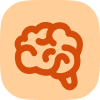Why Mental Exhaustion Hits Harder with ADHD
If you live with ADHD, you may notice something others often miss—you’re mentally exhausted long before the day is done. This isn’t just burnout. It's a specific kind of cognitive exhaustion tied to the way ADHD brains are wired. Whether you're navigating school, work, or daily life, this type of mental fatigue can leave you drained after even short periods of focus.
And yet, despite the exhaustion, the world keeps expecting more—more focus, more memory, more productivity. So how can we reduce mental fatigue without sacrificing performance? The answer starts with understanding how ADHD affects the brain—and how tools like structured brain training can help restore clarity and mental energy.
Understanding the ADHD Brain and Mental Exhaustion
To grasp why fatigue is so common in ADHD, we need to first clarify what ADHD is—and how it shows up neurologically. According to the American Psychiatric Association, “ADHD is one of the most common mental disorders affecting children and can also affect adults. Symptoms include inattention, hyperactivity, and impulsivity, and it often interferes with functioning at school, work, or in social settings”.
The challenge lies in the brain's executive functioning—skills like working memory, sustained attention, and cognitive flexibility. These are the very same systems that get overworked during schoolwork, meetings, or even conversations.
People often confuse add vs adhd, but both fall under the same clinical diagnosis, now categorized by presentation type: inattentive, hyperactive-impulsive, or combined. All types can lead to cognitive strain due to how the ADHD brain filters—or doesn’t filter—stimuli. As WebMD explains, “If you're diagnosed with ADD or ADHD, your brain may struggle to regulate attention, making it harder to switch off and recharge,” contributing to faster mental exhaustion and decreased recall capacity.
Over time, this constant strain builds up to what researchers refer to as mental fatigue, which goes beyond ordinary tiredness. Healthline describes it as “a condition that occurs when your brain is constantly stuck in overdrive, leaving you physically and emotionally drained”.
What Actually Helps: Recharging Your Brain the Right Way
Most advice about focus and productivity assumes a neurotypical brain. But for those with ADHD, solutions like “just take a break” don’t always work. The brain doesn't easily switch off—or back on.
According to WebMD, signs of mental exhaustion often mimic or amplify ADHD symptoms—“You may feel detached, forgetful, or mentally checked out. These are signals that your brain is overworked and needs support”.
So, how can you reduce mental fatigue without adding more pressure to your brain?
- Train Cognitive Stamina in Small Bursts: Short, focused exercises that challenge working memory, attention, and processing speed without overwhelming the brain can strengthen it over time. This is where the Infinite Mind app becomes a helpful companion. Its brief daily drills (just 7 minutes) support the exact executive functions that ADHD wears down: working memory, attention control, and mental flexibility.
- Incorporate Mindfulness and Movement: Mindfulness practices, like deep breathing or quick walks, can help calm the nervous system and re-center attention. These "brain resets" are especially effective for ADHD brains, which benefit from variety and movement.
- Respect Cognitive Limits: Build your day around cognitive energy peaks instead of pushing through brain fog. Structure harder tasks when your focus is sharpest, and avoid multitasking, which rapidly drains mental energy and working memory reserves.
Train Smarter, Not Harder
ADHD doesn't mean you’re lazy or undisciplined—it means your brain is wired differently, and it uses more mental fuel to get through the same tasks others take for granted.
By understanding the science behind mental fatigue, you can begin to take steps that truly support your focus and well-being. The key isn’t to work harder—it’s to work with your brain.
The Infinite Mind app was designed with this in mind: short, science-backed exercises that help you build stronger neural pathways—without the overwhelm. It’s a more innovative way to sharpen focus, improve mental stamina, and protect your cognitive energy throughout the day.
Have you tried it yet? Let us know your experience with ADHD and how Infinite Mind has helped you stay more focused and energized!














